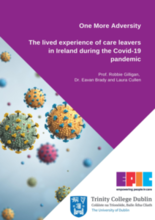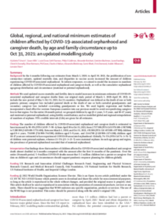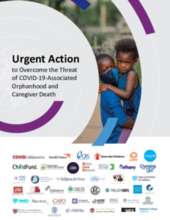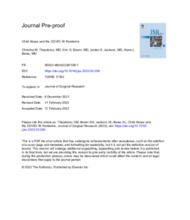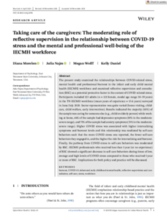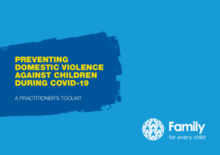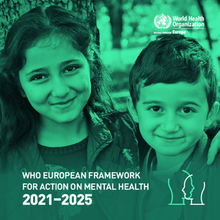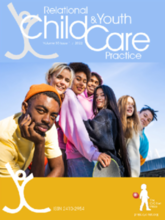This section includes resources on the response to the COVID-19 pandemic as it relates to child protection and children's care.
News on COVID-19 and Children's Care
Webinars and Events on COVID-19 Response
Displaying 51 - 60 of 756
This study explores the lived experiences of care leavers in Ireland during the COVID-19 pandemic.
This review will first highlight systemic/institutional inequities accentuated by the pandemic for subgroups of vulnerable children. These include Asian Americans and Pacific Islanders (AAPI), Black and Latinx, Indigenous populations, refugee communities, those with disability and LGBTQIA+ youth.
At least 5 million children have lost a parent or caregiver due to #COVID19 since March 2020, updated figures suggest. The authors urge actions to prioritise affected children, incl. economic strengthening, enhanced community and family support, and education.
An estimated 6.7 million children have suffered from COVID-19-associated orphanhood and caregiver death in the past two years (as of January 15, 2022). This number is rapidly growing: every 6 seconds another child loses a parent or caregiver. This report, issued by dozens of leading international NGOs, outlines the magnitude of loss globally due to COVID-19 and presents tangible steps that the U.S. government can take to support children and families.
The COVID-19 pandemic had widespread effects, including enhanced psychosocial stressors and stay-at-home orders which may be associated with higher rates of child abuse. The researchers aimed to evaluate rates of child abuse, neglect, and inadequate supervision during the COVID-19 pandemic.
यस अध्ययनले सातवटा केन्द्रित देशहरूमा २१ अर्ध-संरचित अन्तर्वार्ताहरू समावेश गरी गुणस्तरीय अनुसन्धान अध्ययन सञ्चालन गरेर निजी रूपमा सञ्चालित र वित्त पोषित आवासीय हेरचाह संस्थाहरूको सानो संख्यामा COVID-19 को प्रभावको अन्वेषण गर्दछ।
his study examined the relationships between COVID-related stress, mental health and professional burnout in the infant and early child mental health (IECMH) workforce and examined reflective supervision and consultation (RSC) as a potential protective factor in the context of COVID-related stress.
Family for Every Child Alliance members strengthened and adapted their service delivery to provide vital support in the changed circumstances. This Toolkit uses their experiences and lessons learned to guide practitioners to support children and families to prevent domestic violence from affecting children. With specific resources focused on prevention and response, a variety of practices from around the world are given here, to encourage cross-learning and exchange and to generate new learning across the alliance and beyond.
The WHO European Framework for Action on Mental Health (EFAMH), covering the period 2021–2025, sets out a response to current mental health challenges arising from the negative impact that the COVID-19 pandemic has had on population mental health and well-being. The EFAMH provides a coherent basis for intensified efforts to mainstream, promote and safeguard mental well-being as an integral element of COVID-19 response and recovery; to counter the stigma and discrimination associated with mental health conditions; and to advocate for and promote investment in accessible quality mental health services. Implementation and monitoring of this Framework for Action will be powered by the Pan-European Mental Health Coalition, a flagship initiative of the European Programme of Work 2020–2025. Draft of this document was tabled as a background document for the discussion on mental health during the 71st session of the Regional Committee for Europe, Virtual session, 13–15 September 2021.
This article looks at the role of the State of India in ensuring the wellbeing of those it has the responsibility to protect. These include people who have suffered violence, indignity, hunger and life-threatening circumstances. The five-year planning of state and district plans have utilised more resources than it has produced outcomes and output. In this article the authors have compiled lessons learned from strategies that can enable duty holders to emerge as more responsible actors during the COVID-19 pandemic.

